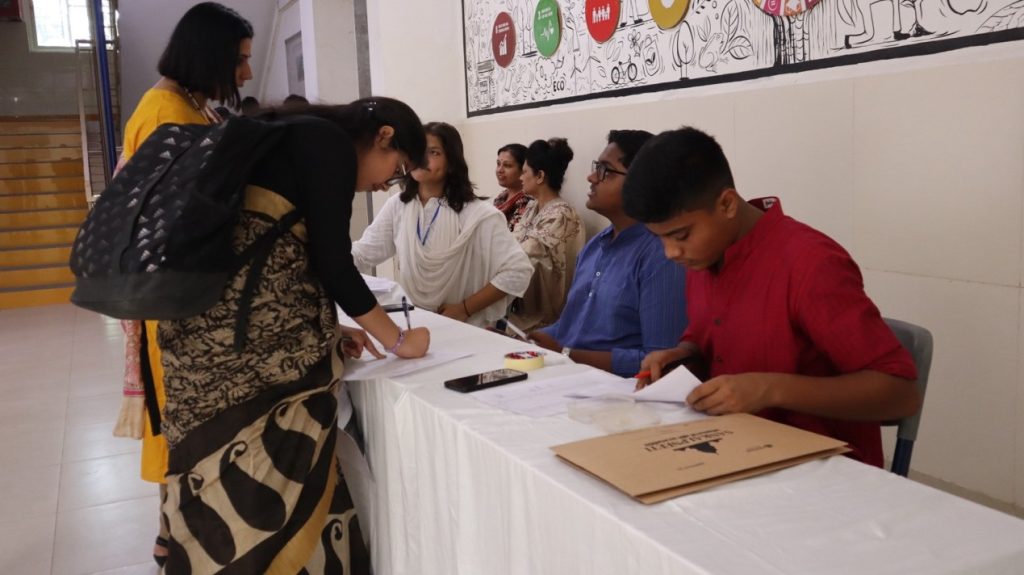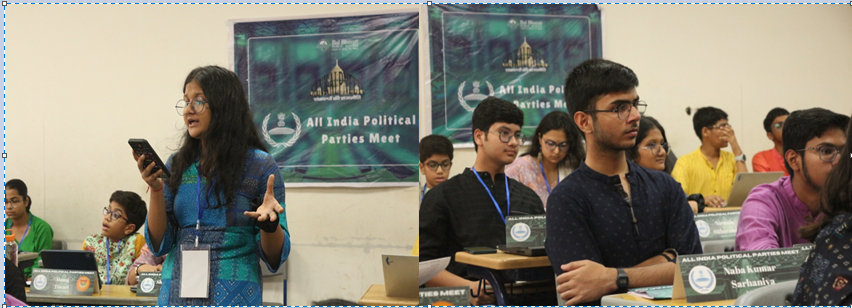REPORT ON THE YOUTH PARLIAMENT SANKALPNEETI
Date: October 9, 2024
Venue: Bal Bharati Public School, Noida
Introduction
The opening ceremony of the Youth Parliament SankalpNeeti, held on October 9, 2024, at Bal Bharati Public School, was a momentous occasion that marked the beginning of an engaging platform for young minds to explore and discuss critical issues affecting the nation. The event was attended by students, faculty, and esteemed guests, all eager to witness the initiation of this significant initiative.
Lighting of the Lamp
The ceremony commenced with the traditional lighting of the lamp, symbolizing the dispelling of ignorance and the illumination of knowledge. The dignitaries present, including school officials and guest speakers, gathered on stage to perform this auspicious act. As the lamp flickered to life, it signified the beginning of enlightenment and the importance of dialogue in a democratic society.
Welcome Song
Following the lighting of the lamp, students of Bal Bharati Public School presented a heartfelt welcome song. The melody resonated throughout the auditorium, setting a warm and inviting atmosphere. The performance not only showcased the musical talents of the students but also reflected their enthusiasm and spirit as they embraced the essence of the Youth Parliament.
Dance Performance
Adding vibrancy to the ceremony, a group of students performed a lively dance, representing the vibrant culture of Gujarat. Their colorful costumes and energetic choreography captivated the audience, celebrating unity in diversity. The dance not only entertained but also conveyed a message of harmony and togetherness, aligning with the themes of democracy and inclusivity that SankalpNeeti promotes.
Principal's Speech
The highlight of the opening ceremony was the inspiring speech delivered by the Principal of Mrs Asha Prabhakar. In her address, she emphasized the importance of youth engagement in the democratic process. She articulated how platforms like SankalpNeeti empower students to voice their opinions, develop critical thinking skills, and become active participants in shaping the future of the nation.
The Principal encouraged the delegates to approach discussions with an open mind, embrace diverse viewpoints, and respect the principles of democracy. She expressed pride in the students' initiative to engage in meaningful dialogue on pressing national issues, reinforcing the idea that the youth are the torchbearers of change.
COMMITTEES
SANKALPNEETI 1.0: RAJYA SABHA
Introduction:
SankalpNeeti (Youth Parliament) held on October 9, 2024, is an initiative aimed at engaging young minds in the democratic process, giving them a platform to discuss and debate significant issues related to national politics. The Rajya Sabha plays a vital role in representing diverse viewpoints and state interests, ensuring an equal voice in the legislative process.
The delegates participating in the committee acted as real representatives in the Rajya Sabha, exchanging viewpoints on the topic “Impact of census data and caste census in India and its effect and implications on social policy and economic development.” The committee members presented unique arguments for and against the topic according to their portfolios.
Caste Census:
A caste census is a survey that collects data about the caste identities of the citizens of a country. In India, caste has influenced social dynamics and access to resources. There are opposing viewpoints about collecting caste data: some support it as a means to identify and address social inequalities, while others believe that it can reinforce divisions and entrench identities.The solutions proposed included an integrated economics program, establishing a feedback mechanism to enhance policy effectiveness, among others.
Uniform Civil Code (UCC):
The Uniform Civil Code (UCC) proposes to replace personal laws based on the scriptures and customs of religious communities with a common set governing every citizen. The UCC aims to ensure equality and justice in various matters.
Members argued that it promotes fair play and judgment. Supporters contended that the implementation of the UCC is essential for fostering a secular state where all citizens enjoy equal rights under the government. Conversely, other members raised concerns about the potential backlash, as it could infringe on religious sentiments and freedoms. They advocated for an inclusive approach that respects cultural identities.
Secularism:
Secularism is a principle that separates religion from politics and governmental affairs, ensuring that all individuals, regardless of their religious beliefs, are treated equally under the law. This framework aims to protect the rights of individuals and maintain harmony among diverse religious communities. Members actively argued how secularism helps to protect minority rights, while opposing members expressed concerns about rigid interpretations that could undermine religious freedoms. The debate underscored the complexities of balancing individual rights and collective cultural values.
Arguments by the Members:
Kapil Sibal: The member argued that the country’s diversity, especially in terms of religious and cultural practices, makes a single code unfeasible, undermining the diversity present in the country. According to him, it could diminish India’s pluralistic traditions. He advocated reforms in personal laws rather than imposing a uniform law.
Hardeep Puri: The senior leader of the BJP supported the implementation of the UCC, viewing it as a feasible step toward equality, unity, and national integration. According to Puri, having uniform laws regardless of religion would eliminate discrepancies in personal law and ensure equal rights for all.
Sanjay Raut: Expressed cautious support for the UCC but stressed the need for planned implementation. He believed that uniform laws could be beneficial but must be introduced in thorough consultation with all communities to avoid any social unrest.
Conclusion:
The proceedings of the Youth Parliament emphasized the critical role of census data and caste considerations in shaping social and economic policies. The in-depth discussion on UCC and secularism reflected participants' engagement with foundational democratic principles. This initiative cultivated a generation poised to contribute to India's democratic landscape.
SANKALPNEETI 1.0: LOK SABHA
Introduction
This report summarizes the deliberation of Committee Lok Sabha of SankalpNeeti 1.0, held on October 9, 2024, at Bal Bharati Public School, Noida. The committee included delegates from various schools, along with a secretariat member who acted as a guest speaker. The delegates enacted of role of politicians for the day, formally debating and discussing a wide range of critical issues faced by India today, from secularism and infrastructure to legal reforms and environmental concerns. These topics were heard by the distinguished chair, Mr. Kartik Deshwal, as the Speaker of the House, and Ms. Sanvi Srijan as the scribe and Deputy Speaker. The delegates debated with utmost decorum and upheld dignity of the allotted portfolios.
Pseudo-Secularism
The concept of pseudo-secularism was debated by the members during the committee, highlighting concerns about the misuse or misinterpretation of secular principles in Indian politics and society, with Asaduddin Owaisi leading the debate and being responded to by the leader of majority, Shri Narendra Modi.
Infrastructural Development
Shri Piyush Goyal raised the issue of infrastructure development in India, addressing both urban and rural needs, and evaluating the effectiveness of policies brought forth by the BJP government.
Health Development
Members of the House thoroughly debated on the health infrastructure and implemented policies, discussing their success rates and repercussions. Shri Dharmendra Pradhan responded to allegations made by opposition leader Shri Rahul Gandhi, with both members engaging in a verbal debate during the zero hour.
Legal and Judicial Faults in Criminal Procedures
Opposition leaders, including Shri Rahul Gandhi and Yusuf Pathan, addressed shortcomings in India's criminal justice system, emphasizing the need for improved efficiency and fairness. They highlighted newly applied criminal laws, such as the Bhartiya Nagrik Suraksha Sanhita, 2023 (BNSS), Bhartiya Nyaya Sanhita, 2023 (BNS), and Bhartiya Sakshya Adhiniyam, 2023 (BNA).
Secularism and Uniform Civil Code (UCC)
The relationship between secularism and the proposed Uniform Civil Code of India was debated, with opposition members raising points about balancing religious freedoms and the potential backlash on religious communities and the judicial system.
Fall of Mumbai Airport
Issues surrounding the decline in services and infrastructure at Mumbai airport were highlighted by Charanjit Singh Channi in response to Piyush Goyal's remarks on policies regarding infrastructure development in India.
Citizenship Amendment Act (CAA) and National Register of Citizens (NRC)
The controversial CAA-NRC issues were debated, including their implications for Indian citizenship and potential impacts on various communities, with concerns raised about harm to the fundamental rights of citizens of different religions.
National Education Policy (NEP) 2020 and Educational Reforms
The committee examined the NEP 2020 and its proposed changes in the Indian education system, highlighting implementation challenges and potential benefits, along with the stress it may impose on children.
Environmental Concerns with Emphasis on Ladakh
Environmental issues were addressed, focusing specifically on the problems in Ladakh. Key topics included the impacts of climate change, biodiversity loss, and sustainable development in fragile ecosystems. The INDIA alliance raised these concerns during the zero hour, to which the BJP government struggled to respond, despite Shri Narendra Modi encouraging other party members to address these allegations.
Allegations of Corruption
The committee discussed corruption issues observed in both the majority and opposition across various sectors of governance, along with potential anti-corruption measures that would be required to address these issues without bias.
Guest Speaker - Asaduddin Owaisi
Notable speeches were delivered by the guest speaker during the zero hour, where women's issues in India were highlighted alongside other national concerns. The speaker criticized the BJP for failing to uphold promises related to women's safety, citing cases like Bilkis Bano and criticizing the 'Beti Bachao Beti Padhao' initiative.
Female Genital Mutilation (FGM)
The practice of FGM was a point of contention for the INDIA alliance, which held the BJP accountable for not responding adequately to the issue, emphasizing the need for efforts to eradicate it in India.
Exclusion of Marital Rape from Bhartiya Nyaya Sanhita (BNS)
The committee debated the controversial exclusion of marital rape from the new criminal code, with the guest speaker (Asaduddin Owaisi) providing significant support to the INDIA alliance members during the zero hour in holding the BJP accountable for this exclusion in the newly applied criminal law.
Necessity and Implications of Bhartiya Nyaya Sanhita (BNS)
The need for the BNS was questioned and debated by the House, with Charanjit Singh Channi targeting Home Minister Shri Amit Shah regarding the introduction of such a new law. Amit Shah responded by explaining that colonial criminal laws needed to be reformed to suit the issue in 21st century. Potential issues regarding the implications of the new criminal code were raised by Charanjit Singh Channi, to which Nirmal Singh responded, noting that new sections have been added to help resolve judicial proceedings.
Conclusion
The Lok Sabha Committee of SankalpNeeti 1.0 covered a diverse range of critical issues faced by modern India. From legal reforms to environmental concerns, and from women's rights to infrastructure development, the discussions reflected the complex challenges and opportunities that lie ahead for the nation. The passionate debates and insightful speeches by the members of the House, particularly on women's issues and legal reforms, demonstrated the engagement and concern of India's youth in shaping the country's future.
SANKALPNEETI 1.0: AIPPM COMMITTEE MEETING: WAQF Amendment
Introduction
The All-India Political Parties Meet (AIPPM) serves as a vital platform for dialogue among diverse political entities and stakeholders. In our upcoming meeting, we will focus on the proposed amendments to the WAQF Act. This discussion is crucial as WAQF properties play a significant role in the socio-economic development of minority communities. The amendments aim to address various challenges, enhance transparency, and improve the management of WAQF properties for community benefit.
Historical Context of WAQF
WAQF, or endowment in Islamic law, has been instrumental in supporting community welfare through charitable donations. Historically, WAQF properties have funded educational institutions, healthcare facilities, and various social services, especially in minority communities. However, over the years, the management of these properties has faced challenges, including mismanagement, lack of transparency, and inadequate utilization.
The proposed WAQF Amendment aims to:
Enhance Transparency: Establish clearer guidelines for the management of WAQF properties to prevent misuse and ensure accountability.
Strengthen Governance: Introduce measures for better governance of WAQF boards, including representation from the community.
Increase Community Benefits: Ensure that the income generated from WAQF properties is effectively utilized for community welfare projects.
Legal Clarity: Address ambiguities in the existing legislation that may hinder effective administration.
Debate and Political Perspectives on the WAQF Amendment:
Minister of Minority Affairs: The Minister of Minority Affairs will open the panel discussion by outlining the government’s position on the WAQF Amendment, emphasizing the importance of empowering minority communities through better management of WAQF assets. The minister will highlight several key points:
Government Commitment: A reaffirmation of the government’s dedication to minority welfare and the role of WAQF properties in achieving socio-economic upliftment.
Benefits of the Amendment: Detailed insights into how the proposed changes will enhance the transparency and accountability of WAQF management, fostering trust within the community.
Examples of Success: The minister may present case studies from states where reforms have successfully improved WAQF property management.
Opposition Leader: The Opposition Leader will provide a counter-narrative, focusing on concerns related to the amendment. They will raise critical points, such as:
Transparency and Accountability: Questions surrounding the effectiveness of the proposed governance structures and whether they truly enhance accountability.
Community Involvement: Concerns about how much real power communities will have in decision-making processes.
Political Interference: Warnings against potential political interference in the management of WAQF properties, undermining their original charitable purpose.
Local MP: A local Member of Parliament will share insights based on grassroots feedback from their constituents. They will address:
Constituent Concerns: Voices from the community regarding the management of WAQF properties and the need for reforms.
Real-world Impact: Personal anecdotes or testimonies illustrating how current management practices affect local communities.
Recommendations for Improvement: Suggestions on how the amendments could be fine-tuned to better serve community needs.
Role of WAQF Properties
WAQF properties have historically provided essential services, including education, healthcare, and poverty alleviation. They serve as a safety net for many vulnerable groups within minority communities. Understanding their impact is crucial for evaluating the effectiveness of proposed amendments.
Community Representatives
Representatives from community organizations will present their views on how the WAQF Amendment could affect beneficiaries. Their discussions will cover:
Positive Impacts: Potential improvements in service delivery and community engagement through better-managed WAQF resources.
Concerns and Challenges: Possible risks associated with the amendment, such as bureaucratic hurdles or the displacement of local management practices that have worked effectively in the past.
Recommendations for Inclusion: Advocating for mechanisms that ensure community voices are integral to the decision-making process regarding WAQF assets.
Open Forum
The open forum provides a space for all participants to engage in a dialogue about the WAQF Amendment. Key points of discussion include:
Diverse Perspectives: Allowing representatives from various political parties, community organizations, and legal experts to weigh in on the amendment.
Collaborative Solutions: Identifying common ground and collaborative solutions that address the concerns raised by both supporters and critics of the amendment.
Future Engagement: Discussing ways to maintain ongoing dialogue beyond this meeting, ensuring that community voices are continually heard in the legislative process.
Conclusion
The AIPPM Committee meeting on the WAQF Amendment presents an invaluable opportunity for collaboration among diverse stakeholders. By engaging in constructive dialogue, it aims to ensure that the amendment serves its intended purpose of enhancing community welfare through better management of WAQF properties.
The outcomes of this meeting will not only shape the future of WAQF management but also contribute to the broader discourse on minority welfare and rights in our society. Together, we can foster a more inclusive approach to governance that respects the needs and voices of all community members.
CLOSING CEREMONY
The closing ceremony of the Youth Parliament SankalpNeeti was a fitting culmination of a day filled with passionate debates, insightful discussions, and vibrant exchanges among young leaders. The event celebrated the achievements of participants and recognized their contributions to the democratic process.
Deputy Chairman's Speech (Hannah)
The ceremony commenced with an address by the Deputy Chairman of the Youth Parliament. She reflected on the importance of the discussions held during the day, highlighting the diverse perspectives shared on critical national issues. She commended the participants for their enthusiasm, engagement, and respect for differing viewpoints, which exemplified the spirit of democracy.
The Deputy Chairman emphasized that the experiences gained during SankalpNeeti would empower the youth to become informed citizens and active participants in shaping India’s future. Her inspiring words set a positive tone for the remainder of the ceremony.
Secretary General's Speech (Arya)
Following the Deputy Chairman, the Secretary General took the stage to share insights from the sessions. She expressed gratitude to all delegates for their hard work and dedication, noting the impressive level of research and preparation displayed throughout the event.
The Secretary General highlighted key moments from the debates, underscoring the significance of issues discussed, such as social policies, economic development, and the role of youth in governance. She encouraged participants to carry forward the lessons learned and continue engaging in meaningful dialogues beyond the confines of the Parliament.
Director General's Speech (Ananya)
The Director General then addressed the audience, reflecting on the overarching goals of SankalpNeeti. She reiterated the importance of nurturing future leaders who are not only aware of their rights but also understand their responsibilities as citizens.
She praised the collaborative spirit exhibited during the sessions and emphasized that the real victory lies in the commitment to remain engaged in civic matters. The Director General also expressed appreciation for the teachers and mentors who supported the students throughout the event, reinforcing the idea that education plays a pivotal role in fostering informed leaders.
Announcement of Winners and Prize Distribution
The ceremony culminated in the announcement of the winners of various categories, acknowledging outstanding performances and contributions during the sessions. Excitement filled the auditorium as the names of the winners were revealed:
Best Delegate
Special Mention
High Commendation
Prizes were distributed to the winners, which included certificates and trophies recognizing their achievements. The audience erupted in applause, celebrating the hard work and dedication of all participants.
REPORT ON THE YOUTH PARLIAMENT SANKALPNEETI
Sankalpneeti 1.0- the Youth Parliament
It is with great pleasure that I extend a cordial invitation to your esteemed institution to partake in an event of profound significance and intellectual Rigour, Sankalpneeti 1.0- the Youth Parliament. This forum has been meticulously crafted to engage the brightest young minds in the incisive exploration of contemporary issues, guiding them toward the formulation of innovative and actionable policies.
Scheduled for the 09th of October, 2024, Sankalpneeti stands as a beacon of civic consciousness, a crucible where eloquence in public discourse meets the art of collaborative problem-solving. Through this event, we aim to cultivate an elevated sense of civic responsibility among the youth, enhance their public speaking prowess, and provide them with an unparalleled understanding of the parliamentary processes that shape our society.
We are confident that the students of your institution would find immense value in this enriching experience. Their participation would undoubtedly infuse the event with fresh perspectives and contribute to the robust and vibrant discussions that Sankalpneeti aspires to host. Moreover, this platform will offer them a rare glimpse into the intricacies of governance and the vital role of active citizenship in today’s world.
Enclosed herein, you will find comprehensive details regarding the event, including the brochure, registration procedures, and participation guidelines. We would be deeply honored to welcome a delegation from your school to join us in this intellectual journey, where their ideas and insights will be most cherished. Kindly register using the provided link https://linktr.ee/
Should you require any further information or clarification, please do not hesitate to reach out to us.

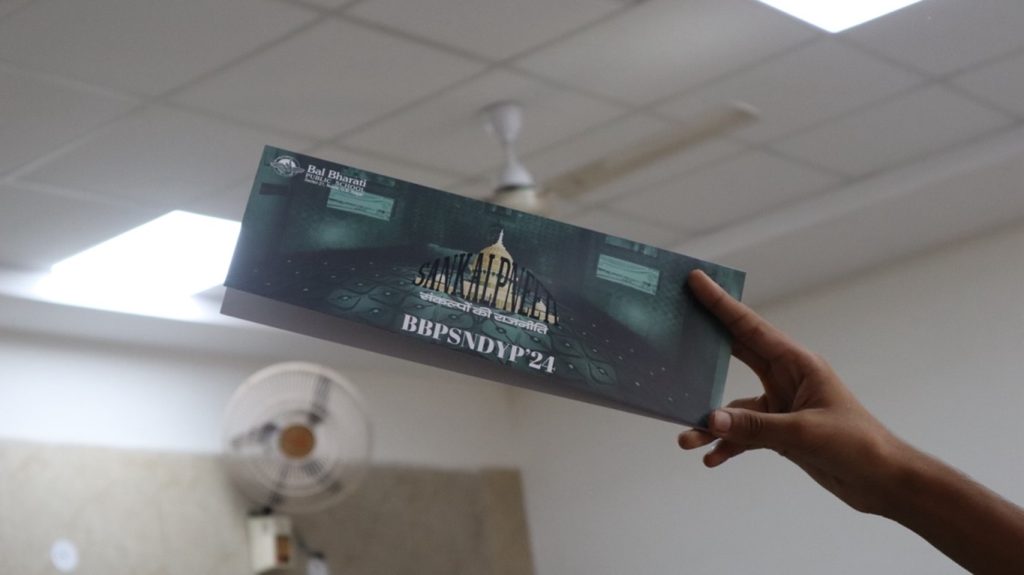

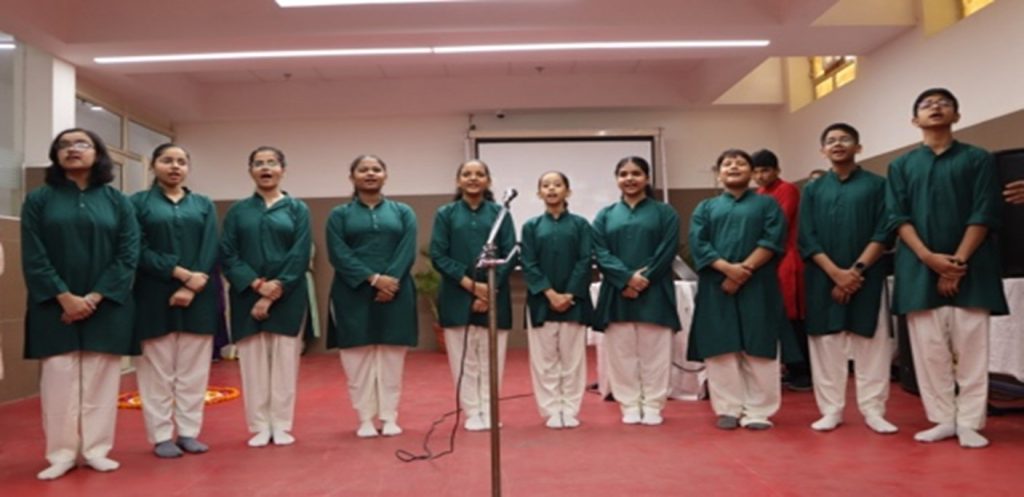
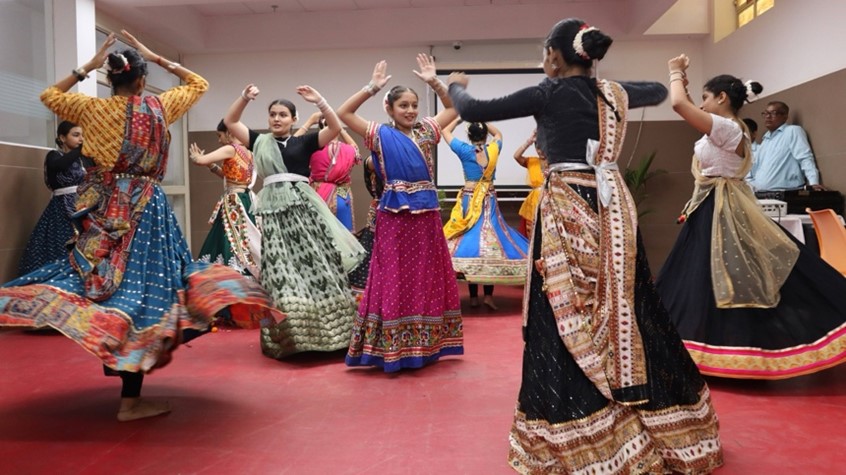
![“The principal of [School/Institution Name] addressing attendees during the grand opening ceremony of SankalpNeeti 2024, inspiring the audience with a vision for the event.” “The principal stands on a decorated stage, delivering a speech during the opening ceremony of SankalpNeeti 2024, with a microphone in hand and a banner in the background.”](https://bbpsnoida.balbharati.org/wp-content/uploads/2024/11/Principals-Address-at-SankalpNeeti-2024-Opening-Ceremony-1024x409.jpg)
